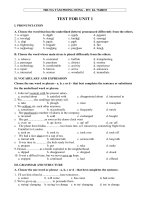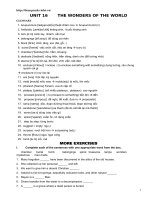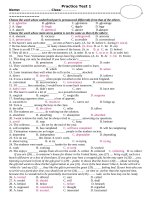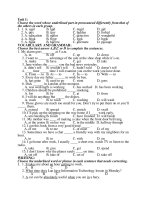Unit 1 Relationship practice test 1
Bạn đang xem bản rút gọn của tài liệu. Xem và tải ngay bản đầy đủ của tài liệu tại đây (93.38 KB, 5 trang )
Unit 1: Family Life
Class:
Complied by Mrs Thuy Phuong
PRACTISE 1
I. Phonetics
Ex1. Give the English word and Vietnamese meaning to each of the
following description
1. /tʃɔː(r)/……………………
6. /ʃɛər/………………
2. /ˈbrɛdwɪnə/………………
7. /ɪˈnɔrməs/………………
3. /ˈhɛvi liftiŋ/………………
8. /ˈsoʊʃəb(ə)l………………
4. /ˈɡroʊs(ə)ri/………………
9. /ˈnərtʃər/………………
5. /ˈhəʊmmeɪkə/………………
10. /ˈbaləns/………………
II. Vocabulary
Ex1. Read the sentences and cross out the correct words.
1. Mum cleans the car/flowers
2. Dad prepares a carpet/good lunch
3. My sister likes to make the beds/dishwasher.
4. I often clean the table/hamster cage and then I feed/load the dishwasher.
5. Can you please water the cupboard/plants?
6. My brother often vacuums the dog/the carpet
7. My father is a good housekeeper, he can cook good meals/tables and he goes
shopping/skiing very often.
8. “Paul, please hang up the beds/ washing.”
9. “Paul, pls walk the dog/hamster.”
10. In winter we like to shovel the floor/snow.
Ex2.
Ex2.Choose the suitable word from the box to complete the sentences
A.
breadwinner
groceries
washing –up
shares
chores
enormous
for
homemaker
sociable
laundry
1. A………………… is a person who manages a home and often raises children
instead of earning money from a job.
2. A ………………is the member of a family who earns the money that the family
needs.
3. In a food store, shop or supermarket, you can buy a lot of ……………such as
food and clothes.
4. There are a lot of dirty clothes and sheets in Tom’s room, so its is time for him
to do his ……………………..
5. Traditionally, girls have to do the…………………… which consists of cleaning
plates, pans, glassed, forks, ect. after a meal.
6. When I’ve done my …………………… which involve cleaning the floor and
washing the curtain, I will go out with my friend.
7. In my family, every one …………………….. the household duties. My mother
cooks, my father cleans, my sister does all the laundry.
8. In many cultures, a father is the breadwinner, who is responsible ………the
family finances.
9. A variety of people do not realize the …………………….. benefits of joining
hand to do housework in a family.
10. At school, Jack is very …………………….. with his teachers and friends. He
likes to meet and spend time with them.
B.
critical
nurture
equally shared
gender
benefits
parenting
convergence
enormou
contributes financial burden
extended
finances
s
1. Mr Long has found that his wife receives a great deal of love when he
……………..to chores.
2. In fact, child care seems to have some important ………………. for young
children
3. Ho Xuan Huong was a female poet who was ……………of gender equality.
4. Ties with the …………… family are generally very close.
5. Mothers play a(n) ……………role in the lives of their children and the bond is
very strong.
6. Fathers and mothers who follow …………… have made a conscious decision to
share equally in the raising of their children, household chores, breadwinner and
time for recreation.
7. Overall, women’s time in domestic work has been declining and we see a slow
but continuing trend of …………… in work time and he domestic division of labor.
8. My mother goes to work too and does every thong else including all the
…………… laundry, cleaning and child care.
9. More than one-fourth of American families face ……………due to medical costs.
10. When your child was young, your role was to ……………and guide him.
C. (1.P17)
nuclear
extended iron
lay
homemaker
household chores care
share
groceries
responsibility
1. Family members should develop a plan together to ……………responsibilities
more fairly.
2. Some husbands may view …………… as women’s work and not manly.
3. A ……………is a person who works at home and takes care of the house and
family.
4. My sister can wash clothes but she can’t ……………even a baby’s handkerchief.
5. ……………are food and are goods are sold in a supermarkets.
6. In order to become a waiter in a restaurant, you have to learn how to
…………… table for a formal dinner party.
7. Traditionally, parents regard their most important …………… as training their
children.
8. Vietnamese tend to live together in extended families rather than …
……………..families.
9. A Vietnamese proverb says “If the father or mother lacks or fails, children are
always taken ……………for by an aunt or uncle”.
Unit 1: Family Life
Class:
10. A typical ……………family often includes three or even four generations, and
typically consisting of grandparents, father and mother, children and grand
children, all living under the same roof.
D.
breadwinner
heavy lifting
iron
chores
responsibilities
share
nurture
homemake
groceries
laundry
r
1. If your father agreed to buy the ……………, you might plan the week’s meals
and make the shopping list.
2. We should pay attention to the conditions that ……………and strengthen early
childhood development and health across the life course.
3. Past studies shown that couples who ……………household chores report feeling
happier overall.
4. Couples who share ……………at home are happier overall.
5. I takes a housewife a lot of time to ……………clothes for household.
6. I have watched my husband and children take over much of my role as a
……………
7. The husband replaces the light bulbs while the wife does the ……………
8. Nowadays, in nuclear families, homemaker and …………… roles have evolved
into something that makes it impossible to define exactly.
9. Many couples find that they look at division of ……………differently.
10. Men and boys do most of the ……………in the family.
Ex3. Give the correct form of the word in the following sentences:
A.
1. To be fair, we should divide the tasks (equal) ……………
2. My mom and dad are checking the (prepare) ……………for the gold wedding
anniversary.
3. Heavy lifting is an action which requires (physic) ……………strength.
4. It is good for them as individual and good for all the (relate) …………… within
the family.
5. (Psychology)……………say that a lot of young people are not aware of these
advantages.
6. Her (contribute) ……………to the company is enormous.
7. To maintain peace, we should not be (criticize) ……………of each other.
8. I want to see very cute and lovely children at (nurse) ……………school.
9. Mary and her husband always join hand in …………… (educate) their children.
10. A person will be considered (grate) ……………if he or she does not take good
care of his or her parents or grandparents.
B.
1. One recent survey show that men’s (contribute) ……………in the home had
increased almost threefold in the last four decades.
2. A mother’s love can be as (benefit) ……………as breastfeeding.
3. In the traditional Japanese family system, the entire estate of family, and the
(finance) ……………assets are transferred from the father to the eldest son
Complied by Mrs Thuy Phuong
4. Mrs White spoke …………… (criticize) of her husband because he didn’t share
anything with household chores.
5. When we have some trouble in our family, we should have family meetings to
work out a (solve)...……………
6. My aunts works (enormous) …………… hard to support her family because her
husband died in a car accident a year ago.
7. The husband is responsible for the family’s economic well-being and take
prides in this role as (provide) …………….
8. Parenting (collaborate) …………… can offer children good opportunities for
their future
9. We do our share of housework willingly so that we can follow ……………
interests in our free time.
10. Researchers found that an unequal (divide) ……………of household chores
negatively affected wives’ marital (satisfy) …………….
III. Grammar
Ex1. Give the simple or continuous form of the verbs.
1. I (try) to call my father in Japan, but I can’t get through.
2. Email messages (usually/ arrive) in seconds.
3. Sharing household chores (become) popular among members in nuclear
families.
4. My mother (use) the computer right now, so I (write) this letter by hand.
5. His cousin (play) the drums so loudly in the kitchen that his neighbor feels
annoyed.
Ex2. Complete the sentences with a verb from the box in the correct
form.
A.
do
empty
lay
make
make
make
take
tidy
wash
wash
1.
2.
3.
4.
5.
6.
7.
8.
B
1.
2.
3.
4.
5.
6.
7.
Why didn’t you ……………your bed this morning?
I can’t come out now. I’m ……………the cleaning.
Could you …………… the dishwasher and put the things away, please?
It is not fair. I …………… breakfast yesterday. Nam should ……………it today.
Look at this bin. Please ……………the rubbish out now.
Mum, I’ve ……………my the room. Can I go out now?
Phong, ……………the table. I’s nearly dinner time.
A: Where is Dad?
B: He ……………the car. He always ……………the car on Sunday morning.
Mrs Lan is not in the office today. She (work) …………… at home today.
“Where (you/come) ……………from?”I’m Italian –from Rome”.
“You/speak) ……………French?” “Just a little”.
Don’t forget your umbrella. It (rain) ……………again.
“Can you help me with the dinner?” “Not now, I (watch) …………… TV.”
In Vietnam, children (look) ……………after their old parents.
“Hi, what (you/do) ……………here? “I (wait) ……………for a friend”
Unit 1: Family Life
Class:
8. Can I phone you back? We (have) ……………dinner.
9. Can I look at the newspaper now? (You/read) ……………it?
10. Mr Long (work) ……………in an office every day, but now he (help) ……………
his wife to prepare dinner.
Ex3. Give the simple or continuous form of the verbs.
1. How do you usually start work on a film? – First, I (read) the script and
(make) notes .
2. I (make) notes of our interview. I hope you don’t mind.
- No, that’s OK.
3. I’m glad we (do) this interview in English, because my French
(be) very poor.
4. Who (play) that guitar? - My son, when he has time.
5. Who (play) the guitar upstairs? - My sister. She’s got a concert tomorrow. What (she, play)? - I think it’s a piece by Mozart.
(She, play) anything else? - Yes, the violin, she’s very musical.
6. Could I use your phone? - I’m afraid it (not work) at the moment.
7. What languages (you, speak) ? - English, French and Russian.
8. Your daughter’s very keen on sports, isn’t she? - Yes, she (play) tennis. - Where
is she now? - She (play) tennis, as usual.
9. What’s that delicious smell? - My husband, he (cook). – Isn’t that unusual? Yes, normally I (cook) and my husband (shop).
10. What a lovely clock! - It (not work) I’m afraid - It’s just been broken
Your answers:
1……………………………… 6…………………………………
2. ………………………………7. …………………………………
3. ………………………………8…………………………………
4. ………………………………9…………………………………
5.……………………………… 10.…………………………………
IV. Reading
A. Choose the suitable word given to complete the following passage.
Ex1.
Working mothers
In the United States today, more than half of mothers with young children
work, compared to about one third (1)………..1970s. Working mothers are now
the rule rather than the exception. Women have been moving into the workforce
not only for career(2) ……….but also because they and their families need the
income.
In many families today, mothers continue to work because they have careers
that they have spent years (3) ……... Some women (4)……….to work soon after
(5) ………..birth because they know that most employers in this country are not
sympathetic to working mothers who wish to take time off to be with their young
children.
Some people still think that a “good mother” is one who (6) ………. work to
stay home with her children. However, no scientific evidence says children are
harmed when their mothers work. A child who is emotionally well adjusted, well
Complied by Mrs Thuy Phuong
loved, and well cared for will thrive regardless of (7) …….. the mother works
outside the home.
In most families with working mothers, each person (8)……….a more active
role in the household. The children tend to (9)……… one another and help in
other ways. The father as a (10)……..is more likely to help with household chores
and child rearing as well as breadwinning. These positive outcomes are most
likely when the working mother feels valued and supported by family, friends,
and coworkers.
1. A. in
B. in the
C. at
D. at the
2. A. enjoy
B. satisfy
C. satisfaction
D. pleasant
3. A. develop
B. to develop
C. developing
D. developed
4. A. return
C. turn
C. happen again D. exchange
5. A. producing
B. making
C. taking
D. giving
6. A. gives up
B. stop
C. end
D. puts up
7. A. where
B. when
C. how
D. whether
8. A. plays
B. does
C. takes
D. makes
9. A. look at
B. look after
C. look for
D. look up
10. A. bread
B. breadwinning C. breadstick
D. breadwinner
Ex2.
It is a common belief in Britain that nowadays men do more housework than
they did in (1)…………..generations. But it is really so? A recent survey has (2)
…………..interesting discoveries. When men help out, they enjoy cooking and
shopping, but most are (3)………….. to do the washing. A quarter of men think
that women are better suitable for (4)…………..after the home than the men and
19% admits to making no (5)………….. to housework.
The average man says that he does one third of the housework, (6)
…………..the average woman says that she does three-quarter of it, so someone
isn’t (7)…………..the truth. It is impossible to fine any men who shared
housework (8)………….. with their partner. Perhaps it isn’t so (9)………….. that
there are some politicians who want new aw forcing men to do their (10)
…………..
1. A. old
B. last
C. first
D. previous
2. A. made
B. given
C. done
D. found
3. A. willing
B. unwilling
C. interested
D. uninterested
4. A. taking
B. seeing
C. watching
D. looking
5. A. part
B. help
C. share
D. contribution
6. A. so
B. because
C. while
D. therefore
7. A. telling
B. saying
C. speaking
D. talking
8. A. equal
B. equally
C. same
D. the same
9. A. surprise
B. surprises
C. surprising
D. surprised
10. A. part
B. role
C. share
D. condition
B. Reading the text carefully and answer the following Questions
Ex1.
Family types vary in different countries and among different cultures. In
Western, industrialized societies, the nuclear family is the most common family
Unit 1: Family Life
Class:
type. It consists of a father, a mother and their children. But nuclear families
exist alongside many other types of family units. In the single- parent family, for
example, a mother or a father heads the family alone. A blended family is formed
when a divorced or widowed parent remarries. As divorce rates have risen, the
number of single- parent and blended families has increased.
In many parts of the world, parents and children live together with other
family members under the same roof. These complex families usually contain
several generations of family members, including grandparents, parents and
children. They may also include brothers or sisters and their families, uncles,
aunts and cousins. Even when relatives do not live together, they still consider
themselves members of the same extended family. In Latin American and
Hispanic American cultures, the extended family includes grandparents, uncles,
aunts and cousins.
1. The nuclear family ranks as the most common family type …………….
A. in many industrialized countries
B. in nuclear with nuclear weapons
C. that consists of more than two generations
D. that leads to divorce of parents.
2. In the single-parent family,…………………….
A. there are often no children
B. only one parent lives with his or her child or children
C. the number of blended children has increased
D. children live with their grandparents.
3. Grandparents, parents and children are mentioned as……….
A. the three typical generations of an extended family
B. three branches of a family tree
C. the closest and happiest relatives in family units
D. a complex paragraph combination
4. The second paragraph is about……
A. American culture
B. relative and family members
C. the relationship between family members
D. the extended family
5. The word “blended” in P1. is closest meaning to……….
A. complex
B. married
C. mixed
D. formed
Ex2.
The American family unit is in the process of change. In the first half of the
20th century, there were mainly two types of families: the extended and the
nuclear. An extended family includes mother, father, children and some other
relatives, living in the same house. A nuclear family is composed of just parents
and children living under the same roof.
As the American economy had progressed from agricultural to industrial one,
people were forced to move to different parts of the country to get good jobs.
These jobs were mainly in the large cities. Now, in fact, three-quarters of
Americans live in urban areas which occupy 2,5% of the national total land mass.
Of the 118 million in the labour force, only 3 million still work on the farm.
Complied by Mrs Thuy Phuong
Since moving for better jobs has often divided the extended family, the
nuclear family became more popular. At present, 55% of the families in the US
are nuclear families. But besides the two types of traditional family groupings,
the family is now being expanded to include a variety of other living
arrangements because of divorce. There is an increase in single-parent families,
in which a father or mother live with one or more children. Divorce has also led to
blended families, which occur when previously married men and women marry
again and combine the children from former marriage into a new family. There
are also some couples who do not want to have children to form two-person
childless families.
21. A nuclear family is one that _____________________.
A. consists of mother, father and children living in the same house.
B. relatives live with.
C. there are only grandparents, parents and their children living in.
D. is bigger than extended family.
22.The expression “under the same roof” means ____________________.
A. a house with one roof.
B. a house with the roof the same as the wall.
C. in the same building.
D. under the house.
23. The nuclear family becomes more popular because of _________________.
A. more divorces.
B. the division of the extended family.
D. fewer jobs in big cities.
D. an increase in single-parents families.
24. How many types of families have there been in the U.S since the first half of
the 20th century?
A. two.
B. three.
C. four.
D. five.
25. A blended family is newly-formed family _____________________.
A. with the combination of children of the two previously married father and
mother.
B. that has only father or mother living with children.
C. in which there are no children.
D. that there is only one couple living in.
Ex3.
Building positive family relationships
The ordinary, everyday things that families do together can help build and
sustain strong relationships with teenagers. These tips might help you and your
family.
Family meals
Regular family meals are a great chance for everyone to chat about their day, or
about interesting stuff that’s going on or coming up. If you encourage everyone
Unit 1: Family Life
Class:
to have a say, no-one will feel they’re being put on the spot to talk. Also, many
families find that meals are more enjoyable when the TV isn’t invited and when
mobile phones and tablets are switched off!
Family outings
Try setting aside time for fun family outings – you could all take turns choosing
activities. A relaxing holiday or weekend away together as a family can also build
togetherness. Our article on teenagers and free time has more ideas for things
you can do as a family.
One-on-one time
One-on-one time with your child gives you the chance to stay connected and
enjoy each other’s company. It can also be a chance to share thoughts and
feelings. If you can, try to find opportunities for each parent to have this time
with your child.
Celebrate your child’s accomplishments
Celebrating your child’s accomplishments, sharing his disappointments, and
supporting his hobbies helps your child know you’re interested in him. You don’t
have to make a big deal of this – sometimes it’s just a matter of showing up to
watch your child play sport or music, or giving him a lift to extracurricular
activities.
Family traditions
Family traditions, routines and rituals can help you and your child set aside
regular dates and special times. For example, you might have a movie night
together, a favourite meal or cooking session on a particular night, a family
games afternoon or an evening walk together.
Household responsibilities
Agreed household responsibilities give children and teenagers the sense that
they’re making an important contribution to family life. These could be things
like chores, shopping or helping older or younger members of the family.
1. Regular famiy meals are a great change for everyone………
A. to have an opportunity to share their daily activities.
B. to talk about TV programmes during the meal.
C. to have the spot to talk about.
D. to talk about interesting things that are coming soon.
2. The following things are true about outdoor activities for our families
EXCEPT……………….
A. all family members try to find out suitable activities.
B. they should be held on holidays or at weekends.
C. they offer a change to share secret thoughts and feelings.
D. they offer the pleasant feeling of being united.
3. Parents can show their attention to their child EXCEPT…..
A. watching their child play sport or music.
B. giving him a lift to extracurricular activities.
C. having a movie night together.
D. setting aside regular dates to do housework.
4. Children who share household chores with their parents will……..
Complied by Mrs Thuy Phuong
A. enjoy each other’s company.
B. make the family life better
C. be given a change to do extracurricular activities.
D. have a family games afternoon or an evening walk together.
5. The main idea of the passage is ……………..
A. to give advice on staying connected and enjoying each other’s company.
B. how to share household chores between family members.
C. to offer pieces of advice to improve family relationships.
D. the important role of family traditions, routines and rituals.









